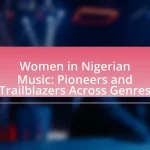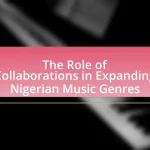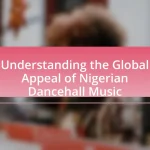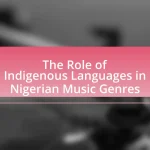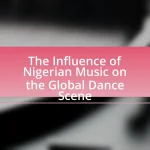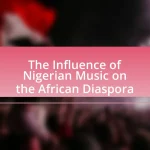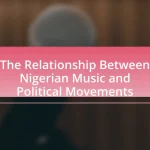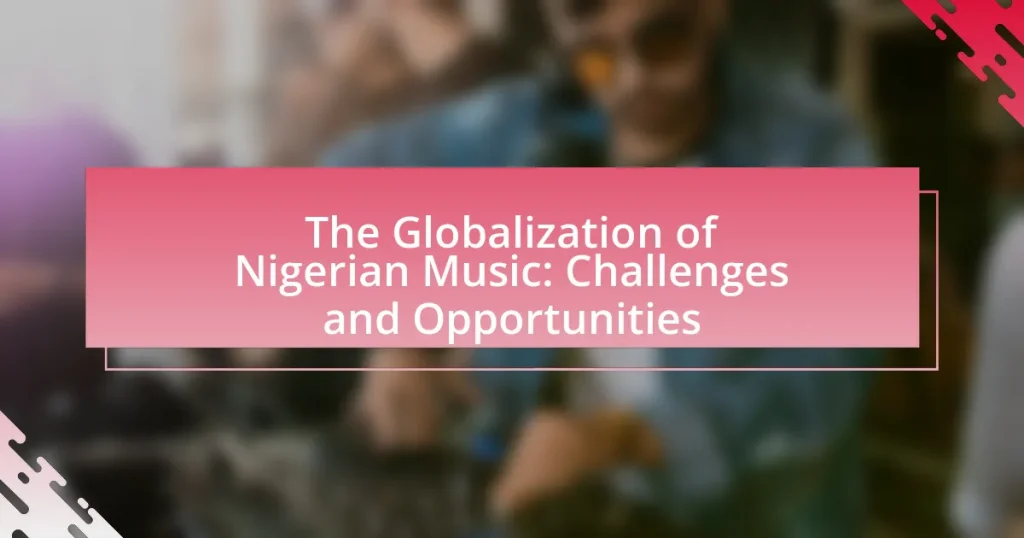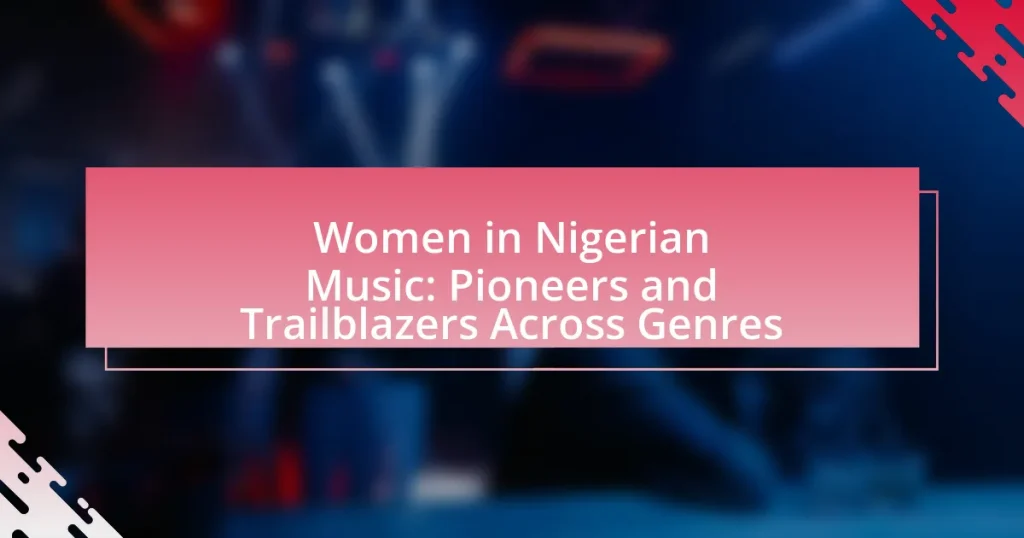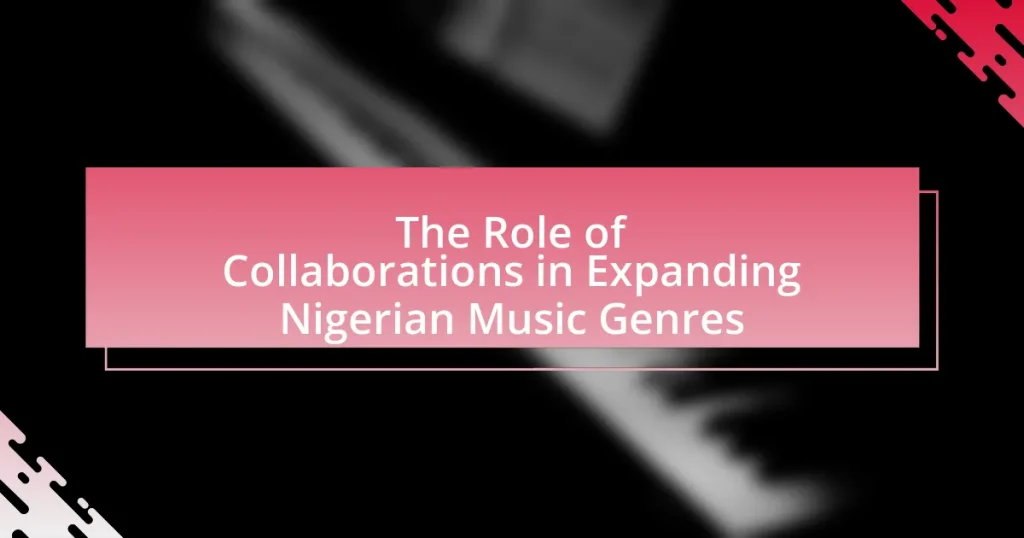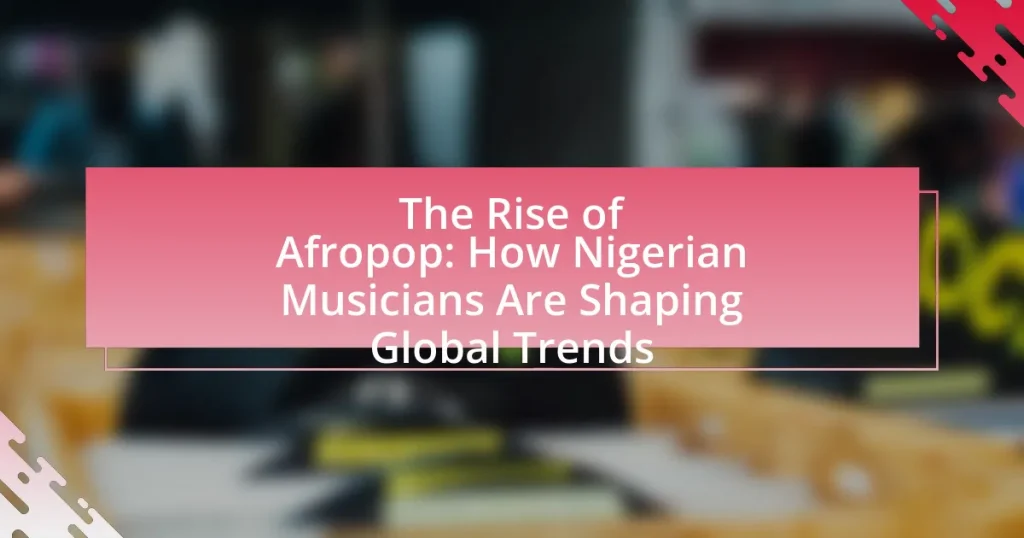The globalization of Nigerian music, particularly through genres like Afrobeats, has led to increased international recognition and influence, characterized by collaborations with global artists and the rise of digital music platforms. Historical factors such as colonialism and migration, along with technological advancements, have significantly shaped this evolution. Key Nigerian artists, including Burna Boy and Wizkid, have achieved global success, while challenges such as cultural appropriation, market saturation, and inadequate infrastructure persist. The article explores the implications of globalization on the authenticity of Nigerian music, the economic challenges faced by artists, and the opportunities for cultural exchange and international collaboration that arise from this phenomenon.
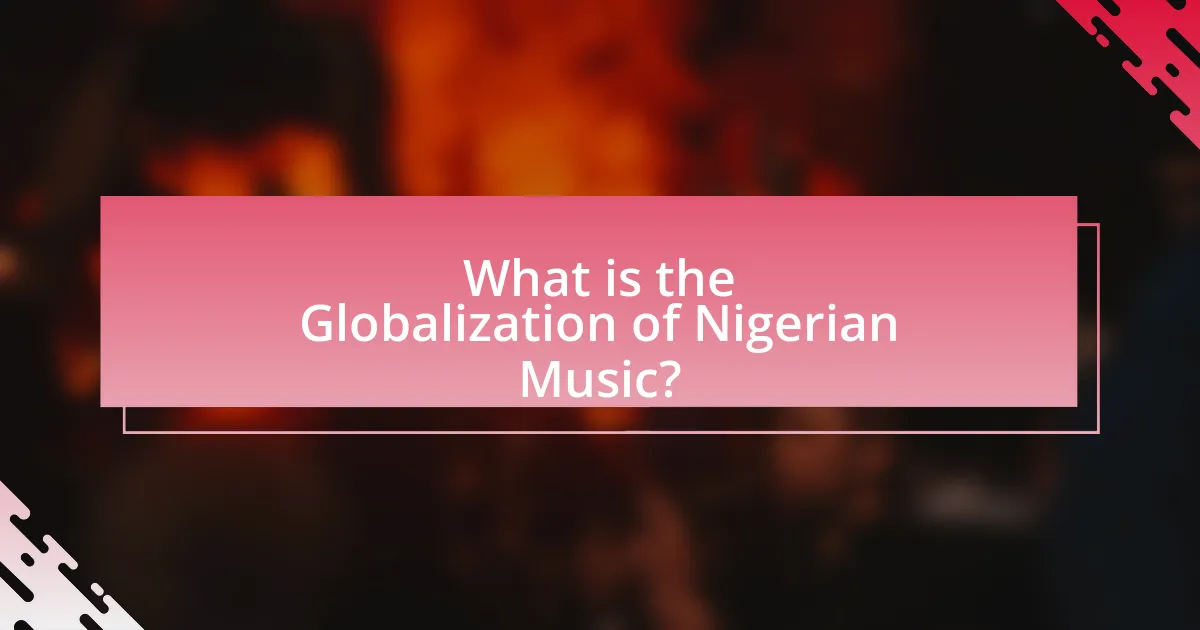
What is the Globalization of Nigerian Music?
The globalization of Nigerian music refers to the increasing international recognition and influence of Nigerian musical genres, particularly Afrobeats, which have gained popularity across the globe. This phenomenon is characterized by collaborations between Nigerian artists and international musicians, the rise of digital platforms for music distribution, and the incorporation of Nigerian sounds into mainstream music worldwide. For instance, artists like Burna Boy and Wizkid have achieved significant success on global charts, with Burna Boy’s album “Twice as Tall” winning a Grammy Award in 2021, highlighting the global appeal of Nigerian music. Additionally, the proliferation of social media and streaming services has facilitated the rapid dissemination of Nigerian music, allowing it to reach diverse audiences and cultures, thereby solidifying its place in the global music landscape.
How has Nigerian music evolved in the context of globalization?
Nigerian music has evolved significantly in the context of globalization by incorporating diverse musical influences and expanding its reach to international audiences. The rise of genres such as Afrobeats, which blends traditional African rhythms with global pop, hip-hop, and electronic music, exemplifies this evolution. Notably, artists like Burna Boy and Wizkid have gained global recognition, with Burna Boy winning a Grammy Award in 2021, showcasing the international appeal of Nigerian music. Additionally, platforms like YouTube and Spotify have facilitated the global distribution of Nigerian music, allowing artists to connect with fans worldwide and collaborate with international musicians, further enhancing the genre’s global footprint.
What historical factors contributed to the globalization of Nigerian music?
The globalization of Nigerian music has been significantly influenced by historical factors such as colonialism, migration, and technological advancements. Colonialism introduced Western musical forms and instruments, which blended with indigenous styles, creating unique genres like Highlife and Afrobeat. Migration, particularly during the post-colonial era, facilitated cultural exchanges as Nigerian artists traveled abroad, exposing international audiences to their music. Additionally, technological advancements, including the rise of the internet and digital platforms, have allowed Nigerian music to reach global audiences, exemplified by the worldwide popularity of artists like Burna Boy and Wizkid. These factors collectively contributed to the international recognition and influence of Nigerian music.
How have technological advancements influenced Nigerian music’s global reach?
Technological advancements have significantly enhanced Nigerian music’s global reach by facilitating easier distribution and access to music worldwide. The rise of digital platforms such as Spotify, Apple Music, and YouTube has allowed Nigerian artists to share their music with international audiences, leading to increased visibility and popularity. For instance, the global streaming market has grown exponentially, with a reported revenue of over $23 billion in 2020, which has directly benefited artists from Nigeria, allowing them to gain followers beyond their local markets. Additionally, social media platforms like Instagram and TikTok have enabled viral trends, further promoting Nigerian music genres like Afrobeats on a global scale. This accessibility has resulted in collaborations with international artists, expanding the influence of Nigerian music and culture worldwide.
What are the key genres of Nigerian music that have gained international popularity?
The key genres of Nigerian music that have gained international popularity include Afrobeats, Highlife, and Nollywood soundtracks. Afrobeats, characterized by its fusion of traditional African rhythms with contemporary pop and hip-hop influences, has seen significant global reach, with artists like Burna Boy and Wizkid achieving international chart success. Highlife, which blends jazz and traditional African music, has also influenced various global music scenes, particularly in the diaspora. Additionally, Nollywood soundtracks have contributed to the global appeal of Nigerian music, as they accompany popular films and resonate with audiences worldwide.
Which Nigerian artists have made significant impacts on the global music scene?
Nigerian artists who have made significant impacts on the global music scene include Burna Boy, Wizkid, and Davido. Burna Boy gained international recognition with his Grammy-winning album “Twice as Tall,” which showcased Afro-fusion and earned him a spot on global charts. Wizkid’s collaboration with Drake on “One Dance” propelled him into the international spotlight, leading to multiple awards and recognition as a key figure in Afrobeats. Davido’s hit “Fall” became one of the most streamed Nigerian songs globally, further establishing his influence in the music industry. These artists have not only achieved commercial success but have also contributed to the global appreciation of Nigerian music genres.
How do traditional Nigerian music styles integrate with contemporary genres?
Traditional Nigerian music styles integrate with contemporary genres through the incorporation of indigenous rhythms, instruments, and vocal techniques into modern musical forms such as hip-hop, R&B, and pop. This fusion is evident in the works of artists like Burna Boy and Wizkid, who blend Afrobeat and highlife with contemporary sounds, creating a unique musical identity that resonates globally. The use of traditional instruments like the talking drum and shekere alongside electronic beats exemplifies this integration, allowing for a rich auditory experience that honors cultural heritage while appealing to a broader audience. Additionally, collaborations between traditional musicians and contemporary artists further enhance this synergy, showcasing the versatility and adaptability of Nigerian music in the global music landscape.
What role do cultural exchanges play in the globalization of Nigerian music?
Cultural exchanges significantly enhance the globalization of Nigerian music by facilitating the sharing of musical styles, instruments, and traditions across borders. These exchanges allow Nigerian artists to collaborate with international musicians, leading to the fusion of genres such as Afrobeats with hip-hop and electronic music, which broadens their audience reach. For instance, collaborations between Nigerian artists like Burna Boy and global stars such as Ed Sheeran have resulted in chart-topping hits that showcase Nigerian music on international platforms. Additionally, cultural exchanges through festivals, social media, and streaming services promote the visibility of Nigerian music, contributing to its acceptance and popularity worldwide. This dynamic interaction not only enriches the global music landscape but also elevates Nigerian music as a vital cultural export.
How do collaborations between Nigerian and international artists enhance cultural exchange?
Collaborations between Nigerian and international artists enhance cultural exchange by blending diverse musical styles and traditions, fostering mutual understanding and appreciation. These partnerships allow Nigerian artists to showcase their unique cultural heritage on a global stage, while international artists gain insights into Nigeria’s rich musical landscape. For instance, the collaboration between Nigerian artist Burna Boy and American musician Beyoncé on the song “Brown Skin Girl” not only highlighted Afrobeat’s influence but also celebrated African culture, reaching millions worldwide. Such interactions promote cross-cultural dialogue, leading to a richer, more inclusive global music scene.
What are the implications of cultural appropriation in the context of Nigerian music?
Cultural appropriation in the context of Nigerian music often leads to the commodification of traditional sounds and practices, which can undermine the cultural significance and authenticity of the music. This appropriation frequently results in non-Nigerian artists profiting from Nigerian musical styles without proper acknowledgment or compensation to the original creators, thereby perpetuating economic disparities. For instance, the global success of Afrobeats has seen many Western artists adopt its elements, yet the financial benefits rarely flow back to the Nigerian artists who pioneered the genre. This dynamic raises concerns about cultural exploitation and the dilution of cultural identity, as traditional music may be altered or misrepresented in the process.
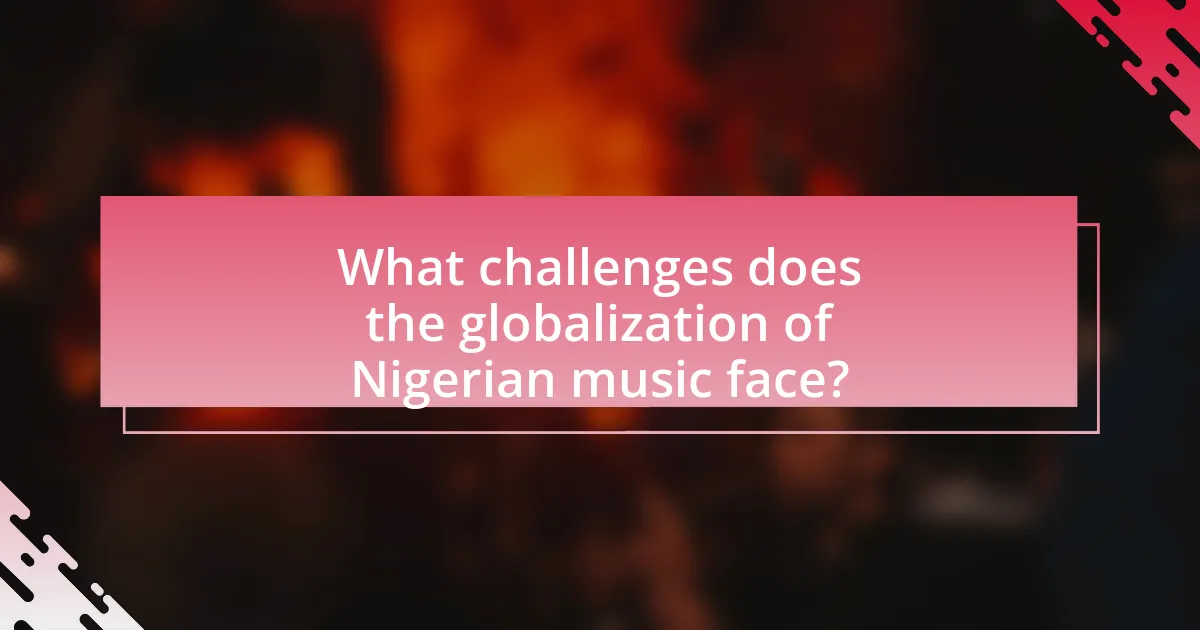
What challenges does the globalization of Nigerian music face?
The globalization of Nigerian music faces several challenges, including cultural appropriation, market saturation, and inadequate infrastructure. Cultural appropriation occurs when elements of Nigerian music are adopted by foreign artists without proper acknowledgment, which can dilute the original cultural significance. Market saturation is evident as the global music industry becomes increasingly competitive, making it difficult for Nigerian artists to stand out. Additionally, inadequate infrastructure, such as limited access to recording facilities and distribution channels, hampers the ability of Nigerian musicians to reach international audiences effectively. These challenges hinder the potential for Nigerian music to thrive on a global scale.
How does the music industry in Nigeria adapt to global trends?
The music industry in Nigeria adapts to global trends by incorporating diverse musical styles, leveraging digital platforms, and collaborating with international artists. Nigerian artists increasingly blend local genres like Afrobeats with global influences such as hip-hop and R&B, creating a unique sound that appeals to a wider audience. The rise of streaming services like Spotify and Apple Music has enabled Nigerian musicians to reach global markets, evidenced by the significant increase in international streams of Nigerian music. Collaborations with global artists, such as Burna Boy’s partnership with Beyoncé on “Brown Skin Girl,” further showcase Nigeria’s integration into the global music scene, enhancing visibility and acceptance.
What are the barriers to entry for Nigerian artists in international markets?
Nigerian artists face several barriers to entry in international markets, including limited access to distribution channels, lack of industry connections, and cultural differences. Limited access to distribution channels restricts their ability to reach global audiences, as many international platforms prioritize established artists. Additionally, the lack of industry connections can hinder collaborations and opportunities for exposure, making it difficult for Nigerian artists to penetrate competitive markets. Cultural differences may also pose challenges in marketing and promoting their music effectively, as international audiences may not fully understand or appreciate the nuances of Nigerian music styles. These barriers collectively impede the growth and visibility of Nigerian artists on the global stage.
How do copyright issues affect Nigerian music on a global scale?
Copyright issues significantly hinder the global reach of Nigerian music by limiting artists’ ability to protect their intellectual property. The lack of robust copyright enforcement in Nigeria leads to widespread piracy, which diminishes potential revenue for artists and discourages international collaborations. For instance, a 2020 report by the International Federation of the Phonographic Industry indicated that Nigeria lost approximately $1.5 billion in potential revenue due to copyright infringement. This financial loss not only affects individual artists but also stifles the overall growth of the Nigerian music industry on a global scale, as international stakeholders may be hesitant to invest in a market where copyright protections are weak.
What impact does globalization have on the authenticity of Nigerian music?
Globalization significantly impacts the authenticity of Nigerian music by introducing diverse influences that can dilute traditional sounds. As Nigerian artists gain access to global platforms, they often blend local genres like Afrobeat with international styles such as hip-hop and R&B, which can lead to a hybridization of musical forms. This blending may enhance commercial appeal but risks overshadowing the cultural roots and unique characteristics of traditional Nigerian music. For instance, the rise of artists like Burna Boy and Wizkid showcases how global exposure has led to the incorporation of various musical elements, which, while popular, may compromise the authenticity of indigenous styles.
How do commercialization and globalization threaten traditional music forms?
Commercialization and globalization threaten traditional music forms by prioritizing profit-driven, mainstream genres over local cultural expressions. This shift often leads to the dilution of unique musical styles, as artists may feel pressured to conform to global trends that favor commercial viability. For instance, in Nigeria, the rise of Afrobeats has overshadowed indigenous genres like Highlife and Juju, resulting in a loss of cultural identity and heritage. Furthermore, the accessibility of global music platforms can marginalize traditional music, making it less visible and less likely to be passed down through generations. This trend is supported by research indicating that as global music consumption increases, local music forms struggle to compete, leading to their gradual decline.
What strategies can be employed to preserve cultural integrity in Nigerian music?
To preserve cultural integrity in Nigerian music, strategies such as promoting traditional music education, supporting local artists, and integrating indigenous instruments into contemporary genres can be employed. Promoting traditional music education ensures that younger generations learn and appreciate their cultural heritage, as evidenced by initiatives like the Nigerian Music Institute, which focuses on teaching traditional music forms. Supporting local artists through grants and platforms helps maintain authenticity, as seen in the rise of artists who blend traditional sounds with modern influences while staying true to their roots. Additionally, integrating indigenous instruments, such as the talking drum and shekere, into popular music can enhance cultural representation, as demonstrated by artists like Burna Boy, who incorporates these elements into his work, thereby fostering a global appreciation for Nigerian culture.
What economic challenges do Nigerian musicians face in a globalized market?
Nigerian musicians face significant economic challenges in a globalized market, primarily due to limited access to international distribution channels and inadequate infrastructure. The lack of robust music distribution platforms restricts their ability to reach global audiences effectively, resulting in lower revenue streams. Additionally, piracy remains a pervasive issue, undermining potential earnings from music sales and streaming. According to a 2020 report by the International Federation of the Phonographic Industry, the Nigerian music industry loses approximately $200 million annually due to piracy. Furthermore, the high cost of production and marketing, coupled with insufficient financial support from local institutions, hampers their competitiveness on the global stage. These factors collectively hinder the growth and sustainability of Nigerian musicians in an increasingly interconnected music market.
How do funding and investment opportunities differ for local versus international artists?
Funding and investment opportunities differ significantly for local and international artists, primarily due to access to resources and market reach. Local artists often rely on government grants, community sponsorships, and local music festivals, which can be limited in scope and funding amounts. In contrast, international artists typically have access to larger funding sources, such as multinational record labels, global sponsorship deals, and international music markets, which provide substantial financial backing and broader promotional opportunities. For instance, a report by the International Federation of the Phonographic Industry (IFPI) highlights that international artists can secure investments from major labels that local artists may not attract, due to their established global presence and marketability. This disparity in funding sources creates a significant gap in the resources available to local versus international artists, impacting their ability to produce and promote their work effectively.
What role do streaming platforms play in the financial success of Nigerian musicians?
Streaming platforms significantly enhance the financial success of Nigerian musicians by providing them with broader access to global audiences and revenue streams. These platforms, such as Spotify and Apple Music, allow artists to distribute their music widely without the need for traditional record labels, which often impose restrictive contracts. For instance, in 2021, Nigerian artists generated over $20 million from streaming services, reflecting a growing trend where musicians can earn royalties directly from their streams. This model not only increases their income but also allows for greater creative freedom, as artists can release music independently and engage directly with fans.
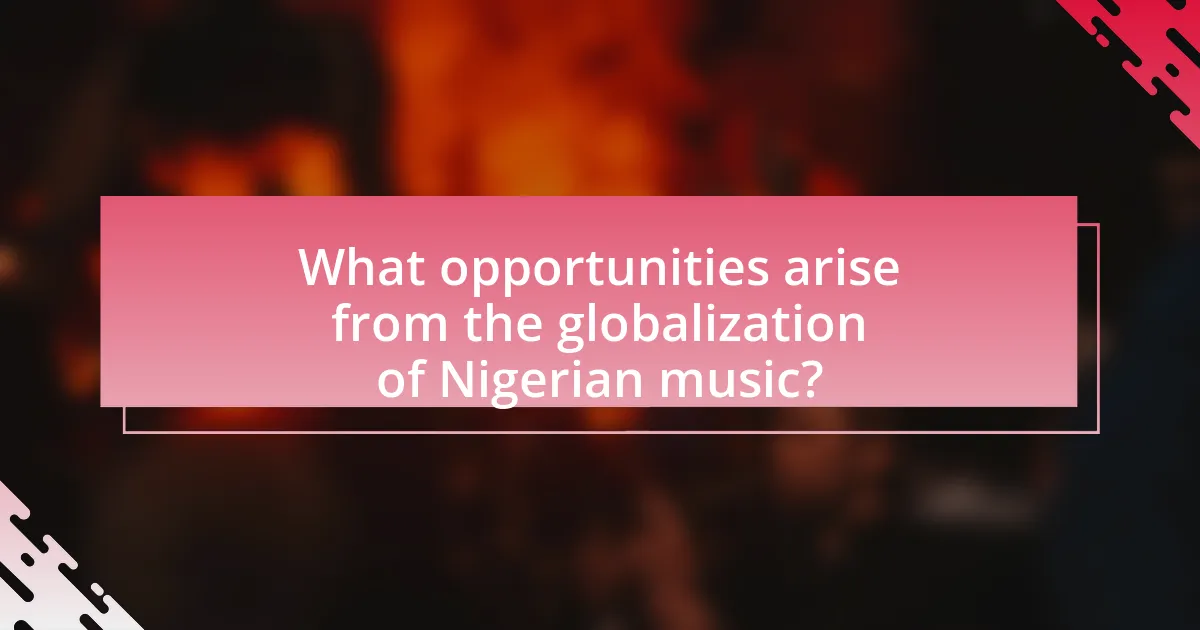
What opportunities arise from the globalization of Nigerian music?
The globalization of Nigerian music creates opportunities for international collaboration, increased market access, and cultural exchange. Nigerian artists can collaborate with global musicians, enhancing their creative output and expanding their audience reach. For instance, the rise of Afrobeats has led to partnerships with international stars like Drake and Beyoncé, which not only elevates the profile of Nigerian music but also opens up new revenue streams. Additionally, the global demand for diverse music genres allows Nigerian artists to penetrate international markets, as evidenced by the significant growth in streaming platforms that feature African music. This globalization fosters cultural exchange, allowing Nigerian music to influence and be influenced by global trends, thereby enriching the global music landscape.
How can Nigerian music contribute to the country’s economic growth?
Nigerian music can significantly contribute to the country’s economic growth by generating revenue through exports, tourism, and job creation. The global popularity of genres like Afrobeats has led to increased international sales of music, with Nigeria’s music industry valued at approximately $39 billion in 2021, according to the International Federation of the Phonographic Industry. This growth attracts foreign investments and promotes cultural tourism, as international fans travel to Nigeria for music festivals and events. Additionally, the music sector creates employment opportunities in various fields, including production, marketing, and performance, further stimulating the economy.
What are the potential benefits of music tourism in Nigeria?
Music tourism in Nigeria can significantly boost the economy by attracting international visitors, which increases revenue for local businesses. This influx of tourists can lead to job creation in sectors such as hospitality, transportation, and entertainment. For instance, the Nigerian music industry contributed approximately $86 million to the economy in 2020, highlighting its potential for growth through tourism. Additionally, music tourism promotes cultural exchange, allowing visitors to experience Nigeria’s rich musical heritage, which can enhance the country’s global cultural standing.
How can the global success of Nigerian music create job opportunities locally?
The global success of Nigerian music can create job opportunities locally by stimulating various sectors such as entertainment, tourism, and technology. As Nigerian artists gain international recognition, there is an increased demand for local talent, including producers, sound engineers, and musicians, which directly leads to job creation in the music industry. For instance, the rise of Afrobeats has led to a surge in music festivals and events in Nigeria, generating employment for event organizers, security personnel, and hospitality workers. Additionally, the growth of digital platforms for music distribution has opened avenues for local tech startups, creating jobs in app development and digital marketing. According to a report by the International Federation of the Phonographic Industry, the Nigerian music industry contributed over $50 million to the economy in 2020, highlighting its potential to drive local employment through its global success.
What are the benefits of international collaborations for Nigerian artists?
International collaborations provide Nigerian artists with enhanced exposure to global markets and diverse audiences. By partnering with international musicians and producers, Nigerian artists can access new fan bases, which can significantly increase their visibility and sales. For instance, collaborations with well-known international artists can lead to features on global music charts, as seen with Burna Boy’s collaboration with Ed Sheeran on “Own It,” which expanded his reach beyond Africa. Additionally, these collaborations often result in the sharing of resources, knowledge, and techniques, allowing Nigerian artists to refine their craft and innovate their sound. This exchange can lead to higher-quality productions and the blending of musical styles, enriching the global music landscape.
How do partnerships with global brands enhance visibility for Nigerian musicians?
Partnerships with global brands enhance visibility for Nigerian musicians by providing access to wider audiences and increased promotional resources. These collaborations often result in international marketing campaigns that showcase Nigerian artists to diverse demographics, significantly expanding their reach beyond local markets. For instance, when Nigerian musicians partner with brands like Pepsi or Nike, they gain exposure through global advertising platforms, social media, and events, which can lead to increased streaming numbers and concert attendance. Additionally, such partnerships often include sponsorships for tours or music videos, further amplifying their presence in the global music scene.
What skills and experiences can Nigerian artists gain from international exposure?
Nigerian artists can gain diverse skills and experiences from international exposure, including enhanced artistic techniques, cultural exchange, and networking opportunities. Exposure to global music trends allows artists to refine their craft by learning new styles and production methods, which can lead to innovative creations. Cultural exchange fosters a deeper understanding of different audiences, enabling artists to tailor their work for broader appeal. Additionally, networking with international peers and industry professionals can open doors to collaborations, performances, and distribution channels, significantly expanding their reach and influence in the global music market.
How does the globalization of Nigerian music influence cultural diplomacy?
The globalization of Nigerian music significantly enhances cultural diplomacy by promoting Nigeria’s cultural identity on a global stage. This influence is evident through the widespread popularity of genres like Afrobeats, which has led to increased international collaborations and cultural exchanges. For instance, Nigerian artists such as Burna Boy and Wizkid have gained recognition in global music markets, resulting in collaborations with international stars and performances at major global events. These interactions foster mutual understanding and appreciation between Nigeria and other cultures, thereby strengthening diplomatic ties. Additionally, the Nigerian music industry’s growth contributes to the country’s soft power, allowing it to project a positive image internationally and engage in cultural dialogue.
What role does music play in promoting Nigeria’s cultural heritage abroad?
Music serves as a vital medium for promoting Nigeria’s cultural heritage abroad by showcasing its diverse traditions and narratives. Through genres like Afrobeats, Nigerian artists convey cultural stories, rhythms, and languages that resonate with global audiences. For instance, the international success of artists such as Burna Boy and Wizkid has led to increased interest in Nigerian culture, evidenced by their performances at global music festivals and collaborations with international artists. This exposure not only elevates Nigeria’s cultural identity but also fosters cross-cultural exchanges, enhancing the global appreciation of Nigerian heritage.
How can Nigerian music foster international relationships and understanding?
Nigerian music can foster international relationships and understanding by serving as a cultural bridge that promotes shared experiences and appreciation among diverse audiences. The global popularity of genres like Afrobeats has led to collaborations between Nigerian artists and international musicians, enhancing cross-cultural dialogue. For instance, artists such as Burna Boy and Wizkid have achieved significant success on global charts, showcasing Nigerian culture and narratives to a wider audience. This exposure not only increases awareness of Nigeria’s rich cultural heritage but also encourages mutual respect and collaboration across borders, as evidenced by Burna Boy’s Grammy Award win in 2020, which highlighted African music on a global stage.
What practical steps can Nigerian artists take to thrive in a globalized music industry?
Nigerian artists can thrive in a globalized music industry by leveraging digital platforms for distribution and promotion. Utilizing platforms like Spotify, Apple Music, and YouTube allows artists to reach international audiences, as evidenced by the rise of Nigerian artists like Burna Boy and Wizkid, who gained global recognition through these channels. Additionally, collaborating with international artists can enhance visibility and credibility, as seen in Burna Boy’s collaboration with Ed Sheeran. Engaging in social media marketing to build a personal brand and connect with fans worldwide is also crucial, with statistics showing that artists with strong online presence have higher engagement rates. Finally, participating in international music festivals and events can provide exposure and networking opportunities, further solidifying their presence in the global market.
